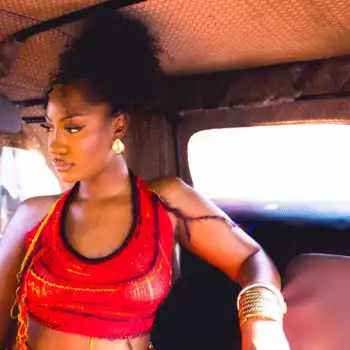Must Read: The Silent Lover - Season 1 - Episode 70
.jpg?w=900&ulb=true&ssl=1)
Must Read: The Silent Lover - Season 1 - Episode 70
“What I really personally believe is, a person should be moderate, open minded and balanced and should have enough broad vision to accept people for what they really are and not for what they look like.” As she finished her sentence, she received heavy clapping and greetings from the audience, which showed the fact that most of them were agreed with what she said.
“For references, and for confirmation of my opinion, please consult the books named “Woman; her true liberty”, by Smith Jacobs, “Islam suppresses women” by Melissa Thomas, “True face of modern woman” by Richard Marshall and many more.
The list just never ends.” Sania added and then said,
“All of these renowned philosophers favour the fact that this unnecessary, formal tradition named Hijaab suppresses Muslim woman, and stops her from being a true liberal woman.”
As she completed her sentence, Sania gave another wonderful smile to the audience, through her full, putting lips and then said,
“That’s all I need to say at the moment.
I think all of you’ve got my message and your gestures show you do agree with me. Thanks for your support and appreciation.”
Her speech brought the females in the audience to their feet, cheering and clapping.
Once again, the audience gave her a big hand, praising her for her valid and genuine points.
“And now I’d like to invite someone who favours and supports Hijaab as a life style”.
The anchorperson rose from her chair and announced.
“She has done masters in Islamic studies and now she’s writing her thesis on Hijaab for her doctorate degree. She also teaches in an Islamic school in her spare hours.” She said and then paused to notice the audience’s reaction. Some of them were yawning sleepily, and some of them were twisting their lips, like something really boring was about to come.
“Poor girl,” The anchorperson whispered to herself in her heart and then said,
“Please welcome, Miss. Hijaab Zehra.”
Every head had turned at her entrance, as she opened the door and stepped into the auditorium swiftly. Dressed gracefully in a full, light green Abaaya and dark green scarf which didn’t show even slightest of her hair and body except her hands, she was looking ultra-modest. In that broad, dark green scarf that covered her head and face up to her eyes, she looked like a holy Goddess, a live statue of grace, soberness, respect and shyness.
“Look… Here we’ve got an UMO.”
A teenage girl with her arms bare and head Unclad had exclaimed sarcastically.
“UMO?” Her companion asked, confused.
“Yeah man…an “Unidentified Moving Object.” Her sentence was followed by laughter from many.
Critical and sarcastic glances were exchanged and throats cleared.
“Oh my God! It can’t be her.” One of the girls from audience exclaimed with shock.
“Why?” Her fellow asked.
“That girl is a walking encyclopedia of knowledge about Islam.”
“But Sania is sharp. She’s not less than her. She’s the best talkative girl I’ve ever seen.
Nobody can defeat her.” Her friend had replied.
“Who’s she?” This time, it was a modern, aunty-kind-of-woman’s voice, as she looked at her with disinterest. “An Afghan woman or something?”
“I don’t think so. But she sure looks like one.” Her husband replied, smiling at her covered figure.
They all burst into laughter.
Ignoring all the voices and the bitter sarcastic comments, Hijaab proceeded toward the stage silently. Once she reached there, she seated herself on the chair placed at the right side of the anchor’s seat. Now, with anchor in the middle, she was face to face with Sania who scanned her with piercing eyes and jerked her head carelessly, her rich hair flowing wildly around her face as she did so.
“All respected ladies and gentlemen, Assalaam O alaikum from a very ordinary woman.” Hijaab began in a very calm and patient voice. With powerful sound system and echo equipment, her voice felt impressive and effective to everyone sitting there.
“I am just a student, and I don’t have much knowledge even on the subject I’m going to advocate. However, I’d try my best to present my opinion and views to you in the easiest form possible. I’m not an expert of my subject like others. However, I’d like to begin my speech with a poem; its title is “Hijaab” of course.”
She began to read in her sweet, musical voice with a confidence that surprised many.
As she read in her s£nsat!onal voice, it seemed like everyone there had turned to stone, frozen at the place.
When you look at me
all you can see,
Is the scarf that covers my hair,
my word you can’t hear
Because you’re too full of fear,
Mouth gaping, all you do is stare.
You think it’s not my own choice,
in your own “liberation” you rejoice.
You’re so thankful that you’re not me.
Think I’m uneducated,
Trapped, oppressed and subjugated.
You’re so thankful that you are free.
But people, you’ve got it wrong-
You’re the weak and I’m the strong,
For I’ve rejected the trap of man.
Cheap clothes, jeans, and skirt,
these are devices for pain and hurt,
Always jumping to the male agenda,
Competing on his terms.
No job share, no baby-sitting facilities,
No feeding and diaper-changing amenities.
No equal pay for equal skill-
your job they can always fill.
Is this liberation?
A person with ideas and thought,
I’m not for sale, I can’t be bought.
I won’t decorate anyone’s arm,
nor be promoted for my charm.
There’s more to me than playing coy.
Living life as a balancing game- mother,
Daughter, wife, nurse, cleaner, cook, lover,
and still bring home a wage.
Who thought up this modern “freedom”
Where man can love them and man can leave them.
This is not free but life in a cage.
“Be-Hijaab? women you can have your life.
Mine – it has less strife.
I cover and I get respected
Surely that’s to be expected
For I won’t demean the feminine
I won’t live to a male criterion.
I dance to my own tune,
And I hope you see this very soon,
for your own sake- wake up and use your sight!
Her voice became a mere whisper as she completed the last stanza. Unexpectedly, this time the people did clap for her, breaking the complete pin-drop silence that had been all around the place during the time she was reading the poem.
“Now, I’d first want to make it clear that what does this term ‘Hijaab’ mean.” She said evenly.
“Hijaab is…” She continued smoothly.
“A life style, a whole way of living.
Unfortunately, most of us interpret the wrong meanings of ‘Hijaab’. We think that it’s just a cloth that covers our hair and body.
No, it’s not ‘just’ that. Basically it’s a covering, imaginary, material and spiritual shield that protects you against bad eyes, sins and evils.” She said impressively.
“Respected guests and my fellows, ‘Hijaab’ is not just a symbol or a religious tradition. Also, it doesn’t mean covering your hair and body only. It is not merely a covering dress but more importantly, it is behaviour, manners, speech and appearance in public.
Dress is only one facet of the total being. Hijaab also includes the way you live, the style you act in, the expression you show, the way in which you talk, walk and do your work.” Her voice was firm and unshaken, without any touch of confusion or hesitancy in it.
“Our women are our jewels, invaluable ornaments.” She went on with the same grace. “The more valuable is a thing, more secured we keep it and it is not displayed to one and all or to the people who visit us.
The first or the most attractive part of a woman is her hair or body itself. It is the hair and the mould of the body that stimulate the animal passion in the sexes. Thus hiding of the hair and the mould of the body of a woman depends upon the value she herself assigns to her own personality and position and to the extent she desires herself to be seen by others or otherwise.“
Hijaab then took a long breath and threw a glance on the people in front of her, who stared at her with pure concentration.
“The Hijaab is modesty. Allah made the adherence to the Hijaab a manifestation for chastity and modesty.
Allah says:
“O Prophet, tell your wives and daughters and the women of the believers to draw their
cloaks (veils) close round them. That will be better, so that they may be recognized and not
annoyed.” (Surah Ahzaab, verse 59)
“In the above verse, there is evidence that the recognition of the apparent beauty of the woman is harmful to her. When the cause of attraction ends, the restriction is removed.”
Hijaab finished her sentence and looked toward Sania, expecting a question.
Sania kept herself silent for a moment, as she didn’t see any reason to argue the point.

.png?w=300&ulb=true&ssl=1)
.jpg?w=300&ulb=true&ssl=1)
.jpg?w=300&ulb=true&ssl=1)


![Boundless (2024) [Danish]](https://www.memesng.com/r/storage.waploaded.com/images/63bf7d6b83940a1153727f2fbbfbc4f0.jpeg?w=50&ulb=true&ssl=1)

![Dange (2024) [Hindi]](https://www.memesng.com/r/storage.waploaded.com/images/232a140cbee267a67ee6d325c096b4f5.jpg?w=50&ulb=true&ssl=1)
![Infested (Vermines) (2024) [French]](https://www.memesng.com/r/storage.waploaded.com/images/3642d529b86ae80c737d17b985d37afd.jpg?w=50&ulb=true&ssl=1)
![The Package (2024) [Thai]](https://www.memesng.com/r/storage.waploaded.com/images/9999e66fa2e94fc304625d14a2fc4879.jpg?w=50&ulb=true&ssl=1)










![Goodbye Earth (2024) [Korean] (TV series)](https://www.memesng.com/r/storage.waploaded.com/images/d6909d7ab7dee12f075363e83ee593e8.jpg?w=50&ulb=true&ssl=1)
![The Asunta Case (2024) [Spanish] (TV series)](https://www.memesng.com/r/storage.waploaded.com/images/5b28adbe37ac7ac0e796e0fe240d4e54.jpg?w=50&ulb=true&ssl=1)

![Pantaxa Laiya (2023) [Tagalog] (TV series)](https://www.memesng.com/r/storage.waploaded.com/images/4c9b447a7ea76cbb004c2668e581c0ba.jpg?w=50&ulb=true&ssl=1)

{{comment.anon_name ?? comment.full_name}}
{{timeAgo(comment.date_added)}}
{{comment.body}}
{{subComment.anon_name ?? subComment.full_name}}
{{timeAgo(subComment.date_added)}}
{{subComment.body}}